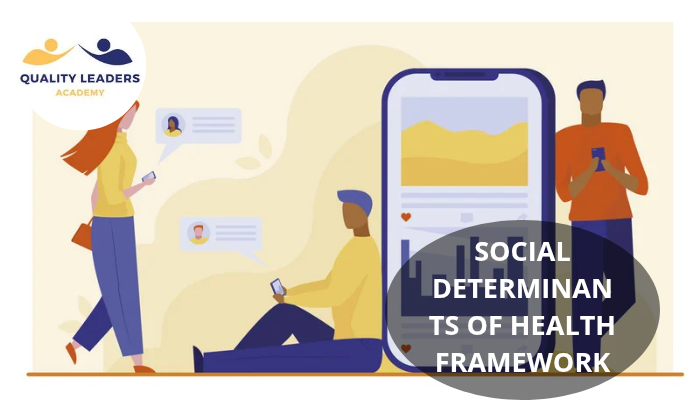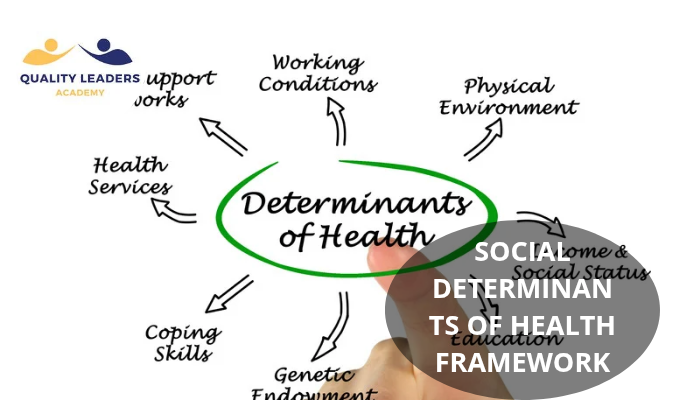The social determinants of health framework offers a valuable lens for understanding how non-medical factors shape health outcomes. As defined by the World Health Organization (WHO), these determinants include the conditions in which people are born, grow, work, live, and age, as well as the broader forces, such as government policies, cultural expectations, and economic structures that shape everyday living conditions.
The CDC emphasizes that these factors are among the primary drivers of health disparities across communities.
By looking beyond the exam room, healthcare professionals can use this framework to design more effective and equitable interventions that address the root causes of poor health. Increasingly, providers, policymakers, and quality improvement leaders recognize that achieving real health equity means extending care beyond traditional clinical settings.
WHAT IS THE SOCIAL DETERMINANTS OF HEALTH FRAMEWORK?

At its core, this framework helps identify and categorize non-medical factors influencing health outcomes. The U.S. Department of Health and Human Services, through its Healthy People 2030 initiative, groups SDOH into five key domains:
- Economic Stability, employment, income, and housing stability
- Access to Education and Learning Quality: This includes opportunities for early childhood learning, literacy development, and access to skill-building programs such as vocational or technical training.
- Healthcare Availability and Standards: Refers to whether individuals have health insurance, how easy it is to find qualified providers, and whether care is delivered in a culturally sensitive and respectful manner.
- Neighborhood Conditions and Physical Environment: Covers aspects like safe and stable housing, reliable transportation options, and the cleanliness of air and water in the community.
Each of these areas plays a vital role in a person’s ability to achieve optimal health.
For example, a patient struggling with food insecurity may find it difficult to manage diabetes, regardless of how well their medication is adjusted.
HOW THE FRAMEWORK IS APPLIED IN CLINICAL PRACTICE
Hospitals and clinics across the United States are using structured screening tools, as the AHCM Screening Tool from the Centers for Medicare & Medicaid Services (CMS), to assess patients’ social needs.
These tools help clinicians systematically identify gaps in care related to non-clinical factors. The CDC also highlights the importance of integrating SDOH screening into practice to promote health equity and improve outcomes.
The goal isn’t just documentation; it’s about building workflows that link identified needs with real resources, such as food banks, transportation assistance, or housing support. This process, called “screening and referral”, is gaining momentum as value-based care models demand better outcomes and more holistic care delivery.
WHY IT MATTERS FOR QUALITY IMPROVEMENT PROFESSIONALS
This framework is more than a public health concept; it’s a quality improvement strategy. Organizations that screen for and address SDOH are often better positioned to reduce hospital readmissions, improve chronic disease management, and boost patient satisfaction.
For healthcare professionals seeking to lead transformative change through quality improvement and equity-focused strategies, earning the Certified Professional in Healthcare Quality CPHQ credential is a powerful next step.
If you're looking for a place to start your CPHQ journey, consider checking out Quality Leaders Academy.
They’ve built a strong reputation for offering CPHQ courses that speak to the real-world challenges healthcare professionals face every day. Their training isn’t just about passing an exam, it’s about giving you the confidence and tools to lead with impact, improve care delivery, and drive meaningful change in your organization. Understanding frameworks like the social determinants of health is essential to modern quality care, and it’s an area deeply explored in CPHQ preparation. One trusted place to start your journey is Quality Leaders Academy, which offers comprehensive, up-to-date CPHQ courses tailored to real-world healthcare challenges. Their programs combine expert instruction with practical insights to help you succeed in the exam and make a measurable impact in your organization. If you're passionate about delivering care that sees the whole patient, this is the kind of training that empowers you to do just that.
FREQUENTLY ASKED QUESTIONS

How do these factors affect health outcomes?
They contribute to preventable complications, emergency room overuse, and increased mortality.
Is this just a public health concern, or does it affect everyday providers?
It affects everyone, from solo practitioners to large hospital systems, and patient outcomes improve when social needs are considered.
THE FUTURE OF HEALTH IS WHOLE-PERSON CARE
Integrating the social determinants of health framework into standard care is no longer optional; it's a global imperative. The World Health Organization underscores the urgent need to address SDOH to reduce health disparities worldwide, while initiatives like Healthy People 2030 in the United States provide national objectives that align care systems with equity-focused, whole-person strategies.
Embracing this framework is not only crucial for national progress but also reflects a growing international consensus on the importance of tackling the root causes of poor health. The future of quality healthcare. Screening tools, referral systems, and community partnerships are critical components, but the shift begins with awareness and education.
As healthcare continues to evolve, professionals who understand and apply this framework will be positioned to lead meaningful change. Whether you're a provider, administrator, or quality leader, embracing the human story behind every health encounter is what will truly drive better outcomes.
The time to act is now, because when we care for the whole person, not just their symptoms, we build a healthier future for all.
Resources:
https://www.who.int/health-topics/social-determinants-of-health#tab=tab_1
https://www.cdc.gov/about/priorities/why-is-addressing-sdoh-important.html



